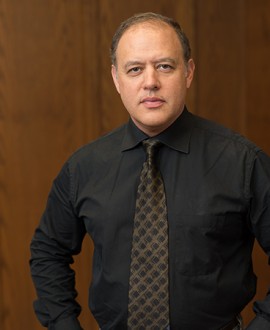On March 24, 2021, the History of Science and Technology program hosted Dr. Brandon Konoval, professor in the Arts One program and the School of Music at the University of British Columbia (UBC), for its annual MacLennan Lecture.
Founded in 2017 through a donation from Oriel MacLennan, the MacLennan Lecture takes place as part of a visiting scholar program hosted by the History of Science and Technology program. This year’s MacLennan Lecture was also supported by the Early Modern Studies program and Foundation Year Program (FYP) and by the Fountain School of Performing Arts. Each year’s scholar-in-residence, in addition to giving the public MacLennan Lecture, spends time in seminar discussions with both King’s students and students from local secondary schools. Although Konoval was unable to participate in the usual seminar discussions and instead delivered his lecture virtually from Vancouver due to the pandemic, the lecture had a strong turnout, with audience members from multiple programs at King’s and Dalhousie tuning in from across Canada and even overseas.

Dr. Brandon Konoval presented the 2021 MacLennan lecture in the History of Science and Technology on March 24.
At UBC Konoval teaches in two programs; the School of Music, and Arts One, a program similar to FYP. Combining the “two hats” he wears at UBC—music theory and philosophy—Konoval delivered an engaging lecture on Jean-Jacques Rousseau’s relationship to the musical theory of Jean-Philippe Rameau. The talk also examined how Rousseau’s own musical theory helped to inform his other philosophy. The contents of this lecture fit into Konoval’s broader interests in the sociology of music and the connections between music and science.
One of Konoval’s core arguments was that the greatest source of tension between Rousseau and Rameau over music and music theory stemmed from their opposing conceptions of both the origin of music and its purpose—this in spite of the fact that Rousseau was a disciple of Rameau early in his musical career. Where Rameau theorized that harmonies between notes were the source of music, and thereby “mathematized” music, in keeping with the Enlightenment’s value of reason and rationality, Rousseau theorized that music emerged from language—passionate language, to be precise—and that melody was the “natural” part of music, rather than harmony, which Rousseau saw as artificial. Konoval then went on to discuss how Rousseau’s “natural history” of language and music connect to the rest of Rousseau’s philosophy through the idea that rationality had changed music irreversibly, making it less passionate—just as rationality removed humans from the state of nature. While Rousseau is mostly studied as a philosopher, Konoval is not alone in researching Rousseau’s musical interests, and his lecture cited other scholars with similar research interests.
Konoval began and ended his lecture by playing recorded selections: the first was from Rousseau’s opera, The Village Soothsayer and the second from Rameau’s Castor and Pollux. Konoval, who has experience in concert piano, interspersed his lecture with recorded segments in which he demonstrated the relevant harmonic concepts. These recordings provided a useful point of reference for the differences Konoval discussed between Rameau and Rousseau.
Although the Zoom webinar format does not lend itself to discussions with the audience as well as an in-person lecture, the question period at the end was still filled with engaging questions for Konoval from both students and professors. Many of the questions focused on the connection between Rousseau’s theory of the development of music and his depiction of the human state of nature in the Discourse on Inequality.
Past MacLennan visiting scholars have included Dr. Kim TallBear (University of Alberta), Dr. Jacalyn Duffin (Queen’s University), and Dr. Sundar Sarukkai (National Institute of Advanced Studies, India), speaking on topics ranging from science and social rationality to the role of science and technology in Canadian decolonization.
Sophie Lawall is a third-year student studying Early Modern Studies and English.

